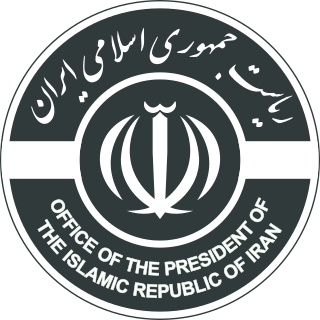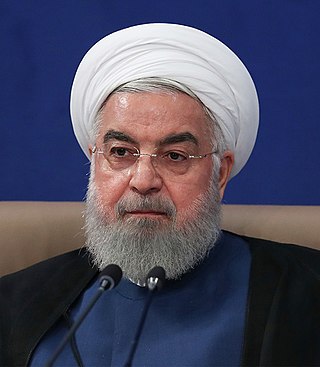
The president of Iran is the head of government of the Islamic Republic of Iran and the second highest-ranking official, after the Supreme Leader. The first election was held in 1980 and Abulhassan Banisadr won. Mohammad Mokhber, the first vice president, is acting as president following the death of Ebrahim Raisi on 19 May 2024.

The Guardian Council is an appointed and constitutionally mandated 12-member council that wields considerable power and influence in the Islamic Republic of Iran.

The Islamic Consultative Assembly, also called the Iranian Parliament, the Iranian Majles or ICA, is the national legislative body of Iran. The parliament currently consists of 290 representatives, an increase from the previous 272 seats since the 18 February 2000 election.

The Assembly of Experts, also translated as the Assembly of Experts of the Leadership or as the Council of Experts, is the deliberative body empowered to appoint the Supreme Leader of Iran. All directly elected members must first be vetted by the Guardian Council.

Mohammad Yazdi was an Iranian conservative and principlist cleric who served as the head of Judiciary System of Iran between 1989 and 1999. In 2015, he was elected to lead Iran's Assembly of Experts, defeating Akbar Hashemi Rafsanjani, a former president, by a vote count of 47 to 24.

Iran elects on national level a head of state and the head of government, a legislature, and an "Assembly of Experts". City and Village Council elections are also held every four years throughout the entire country. The president is elected for a four-year term by the citizens. The Parliament or Islamic Consultative Assembly currently has 290 members, also elected for a four-year term in multi- and single-seat constituencies. Elections for the Assembly of Experts are held every eight years. All candidates have to be approved by the Guardian Council. See Politics of Iran for more details.

The fourth Iranian Assembly of Experts election was held on 15 December 2006. The Assembly of Experts is a Council of 86 mujtahids that elect the Supreme Leader, and oversee his actions. The members of the Assembly are elected every eight years directly by the people of Iran.

Sayyid Hassan Khomeini is an Iranian cleric. He has been called "the most prominent" grandchild of Ruhollah Khomeini, who had 15 grandchildren in total, and the one "who many think could have a promising political future".

The supreme leader of Iran ), also referred to as Supreme Leader of the Islamic Revolution, but officially called the Supreme Leadership Authority, is the head of state and the highest political and religious authority of the Islamic Republic of Iran. The armed forces, judiciary, state radio and television, and other key government organizations such as the Guardian Council and Expediency Discernment Council are subject to the Supreme Leader. According to the constitution, the Supreme Leader delineates the general policies of the Islamic Republic, supervising the legislature, the judiciary, and the executive branches. The current lifetime officeholder, Seyyed Ali Hosseini Khameneh known as Ali Khamenei, has issued decrees and made the final decisions on the economy, the environment, foreign policy, education, national planning, and other aspects of governance in Iran. Khamenei also makes the final decisions on the amount of transparency in elections, and has dismissed and reinstated presidential cabinet appointees. The Supreme Leader is legally considered "inviolable", with Iranians being routinely punished for questioning or insulting him.

Hassan Rouhani is an Iranian Islamist politician who served as the seventh president of Iran from 2013 to 2021. He is also a sharia lawyer ("Wakil"), academic, former diplomat and Islamic cleric. He served as a member of Iran's Assembly of Experts from 1999 to 2024. He was a member of the Expediency Council from 1991 to 2013, and also was a member of the Supreme National Security Council from 1989 to 2021. Rouhani was deputy speaker of the fourth and fifth terms of the Parliament of Iran (Majlis) and Secretary of the Supreme National Security Council from 1989 to 2005. In the latter capacity, he was the country's top negotiator with the EU three, UK, France, and Germany, on nuclear technology in Iran, and has also served as a Shia mujtahid, and economic trade negotiator.

Parliamentary elections were held in Iran on 26 February 2016 to elect members of the Islamic Consultative Assembly for all seats in the 10th parliament in the Islamic Republic era and the 34th since the Persian Constitutional Revolution. A second round was held on 29 April 2016 for some constituencies where candidates failed to obtain the required minimum 25 percent of votes cast. The elected MPs served from 28 May 2016 to 27 May 2020.
The fifth Iranian Assembly of Experts election were held in Iran on 26 February 2016 to elect the members of the Assembly of Experts. All 88 members of the Assembly of Experts, who are known as mujtahids, are directly elected. The elections had been planned for 2014, but were delayed in order for the election to be held alongside the Islamic Consultative Assembly elections.

The third Iranian Assembly of Experts election was held on October 23, 1998 to elect all 86 members in 28 constituencies. 17,857,869 citizens voted in the elections, marking a 46.3% turnout.
The second Iranian Assembly of Experts election was held on October 8, 1990, to elect all 83 members in 24 constituencies. The election was the first election of the assembly since Ayatollah Khomeini's death and election of Ali Khamenei as the new Supreme Leader. This election had the lowest turnout in the history of the Islamic Republic of Iran with 37.09% of the eligible voters participating.

The 2021 London Assembly election was held on 6 May 2021 to elect the members of the London Assembly, alongside the 2021 London mayoral election. The mayoral and Assembly elections were originally to be held on 7 May 2020, but on 13 March 2020 it was announced the election would be postponed until 2021 due to the COVID-19 pandemic. It was the sixth election since the Assembly was established in 2000. Due to the previous term being extended to 5 years, those elected would only serve a three-year term until the next election in 2024. The election was held on the same day in 2021 as other elections in the UK; the UK local elections, Scottish Parliament election, and Welsh Senedd election.

Presidential elections were held in Iran on 18 June 2021, the thirteenth since the establishment of the Islamic Republic in 1979. Ebrahim Raisi, the then Chief Justice of Iran, was declared the winner in a highly controversial election. The election began with the mass disqualification of popular candidates by the Guardian Council, and broke records of the lowest turnout in Iranian electoral history, as well as had the highest share of protest blank, invalid and lost votes despite a declaration by the Supreme Leader of Iran, Ali Khamenei, considering protest voting religiously forbidden (haraam) as it would "weaken the regime." Reporters Without Borders reported 42 cases of journalists being summoned or threatened for writing about candidates, and the chief of the police threatened people who discouraged others to vote.

An election for the third Supreme Leader of Iran is scheduled to be held following the end of the current tenure of Ali Khamenei. As of January 2024, no person has been officially declared as the heir to the current leader nor as a nominee, though various sources have written on potential candidates.

Legislative elections were held in Iran on 21 February 2020, four years after the previous legislative election in 2016. Due to the COVID-19 pandemic in Iran, the second round, to elect eleven seats, was postponed until 11 September 2020.
A by-election was held on 18 June 2021 for three vacant seats of the Assembly of Experts in Tehran Province, caused by death of Ebrahim Amini, Hashem Bathaie and Mohammad-Ali Taskhiri. It was held along with three other elections, including the presidential election, the city council election and the parliamentary by-election.
A by-election was held on 14 March 2008 for the vacant seat of the Assembly of Experts in Tehran Province, caused by death of Ali Meshkini who held office as chairman of the assembly. It was held along with the 2008 Iranian legislative election.












